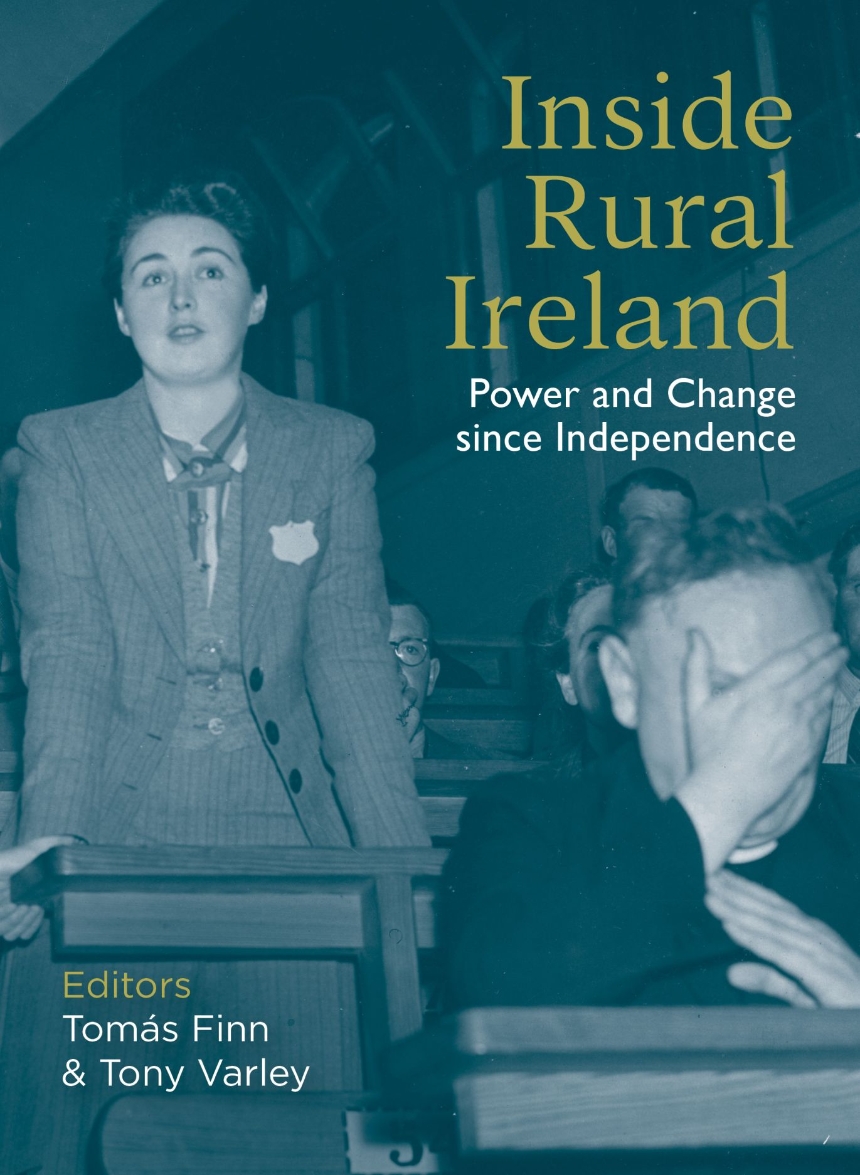9781739086367
Distributed for University College Dublin Press
Inside Rural Ireland
Power and Change since Independence
Fresh analyses on decades of rural and agricultural centrality in Ireland, and the power players seeking influence over rural outcomes.
In the early decades of twentieth-century Ireland, a new kind of farmer, one who was among the landowners who emerged as the major winners in the recent agricultural revolution, exerted considerable influence over the new Free State and Irish Catholicism. After 1932, the strides of industrialization were never strong enough to threaten agriculture’s economic primacy or the countryside’s central position. It was not until the severe crisis conditions in the 1950s that a transformation began, setting southern Ireland on a gradual path toward urban industrialism. Exploring rural Ireland before and after this momentous transition, the contributors to Inside Rural Ireland examine the power of varying groups—ruling politicians and state bodies, farmers, clerical and non-clerical civic activists, intellectuals (social commentators, as well as fiction writers), returned emigrants, and farm women—to promote or impede rural changes.
The book reveals that the state’s power to promote rural change has contracted and expanded throughout the years since Ireland joined the European Union in 1973. Furthermore, it explores divided views on the impact of urban industrialism on rural interests. Throughout much of the period, since the 1950s, the power of organized farmers to represent Irish farming interests remained high as the number of those working the land continued to dwindle. In recent decades, the persisting limited power of clerical activists and intellectuals to restructure rural civil society along Catholic or Christian lines has undergone further decline. Most recently, the prospects for farm women to increase their relative power have arguably improved the most, in certain respects, even if land ownership still remains stubbornly in male hands.
In the early decades of twentieth-century Ireland, a new kind of farmer, one who was among the landowners who emerged as the major winners in the recent agricultural revolution, exerted considerable influence over the new Free State and Irish Catholicism. After 1932, the strides of industrialization were never strong enough to threaten agriculture’s economic primacy or the countryside’s central position. It was not until the severe crisis conditions in the 1950s that a transformation began, setting southern Ireland on a gradual path toward urban industrialism. Exploring rural Ireland before and after this momentous transition, the contributors to Inside Rural Ireland examine the power of varying groups—ruling politicians and state bodies, farmers, clerical and non-clerical civic activists, intellectuals (social commentators, as well as fiction writers), returned emigrants, and farm women—to promote or impede rural changes.
The book reveals that the state’s power to promote rural change has contracted and expanded throughout the years since Ireland joined the European Union in 1973. Furthermore, it explores divided views on the impact of urban industrialism on rural interests. Throughout much of the period, since the 1950s, the power of organized farmers to represent Irish farming interests remained high as the number of those working the land continued to dwindle. In recent decades, the persisting limited power of clerical activists and intellectuals to restructure rural civil society along Catholic or Christian lines has undergone further decline. Most recently, the prospects for farm women to increase their relative power have arguably improved the most, in certain respects, even if land ownership still remains stubbornly in male hands.
300 pages | 10 halftones | 7.09 x 9.69
History: British and Irish History, European History, General History
Table of Contents
List of Abbreviations
List of Plates
Authors Biographies
Acknowledgments
Foreword
Maurice Manning
Introduction
Martin O’Donoghue and Emer Purcell
John Redmond, Irish Pasts, Imperial Actualities: Contexts of and Constraints on his Battle for Home Rule
Margaret O’Callaghan
Isaac Butt’s Legacy: the Irish Parliamentary Party, 1879-1918
Colin W. Reid
The Chairman and the Chief: Redmond and Parnell
Pauric Travers
Redmond and Carson: Bloodshed, Borders, and the Union State
Alvin Jackson
The Irish Party: Recruitment and the Great War, c. 1914-1915
Michael Wheatley
Women’s Suffrage, John Redmond, and the Irish Parliamentary Party
Margaret Ward
Biographies
Acknowledgements
Abbreviations
Introduction
1Tony Varley and Tomás Finn, Inside and Outside Rural Ireland: The Politics of Change since 1922
State Interventions and Rural Planning
2Gearóid Ó Tuathaigh, Shifting the Goalposts: Changing Narratives of Western Regeneration in the 1920s
3Peter Murray and Maria Feeney, The Rural Dimension of State Planning: Ireland in the 1960s
Clerical Power and Rural Civil Society
4Eoin Devereux, Community Development Visionary or Social Conservative? Canon John Hayes Reassessed
5Tony Varley, Cultivating Vocational Solidarity: The Class and Gender Politics of Organising Irish Agriculture
6Tomás Finn, Power and the Politics of Persuasion: Comparing Muintir na Tíre’s and Tuairim’s Relationship with Church and State in Post-war Ireland
Intellectuals, Rural Idylls and Gritty Realities
7Caitriona Clear, Contemporary Rural life in Irish Fiction of the 1940s
8Bryan Fanning, Catholic Intellectuals and Rural Decline
Farm Women, the State, and Negotiating Powerlessness
9Anne Byrne and Tanya Watson, Women and Patriarchal Power in Rural Ireland
10Mícheál Ó Fathartaigh and Anne Cassidy, Challenging Patriarchal Power? Women Advisors as Change Agents in Twentieth-Century Irish Agriculture
The Contemporary Countryside
11Mary Cawley, Emigration and Return: Limitations and Attractions of the Irish Countryside
12Mary E. Daly, The Survival of Rural Ireland
Notes
Bibliography
List of Plates
Authors Biographies
Acknowledgments
Foreword
Maurice Manning
Introduction
Martin O’Donoghue and Emer Purcell
John Redmond, Irish Pasts, Imperial Actualities: Contexts of and Constraints on his Battle for Home Rule
Margaret O’Callaghan
Isaac Butt’s Legacy: the Irish Parliamentary Party, 1879-1918
Colin W. Reid
The Chairman and the Chief: Redmond and Parnell
Pauric Travers
Redmond and Carson: Bloodshed, Borders, and the Union State
Alvin Jackson
The Irish Party: Recruitment and the Great War, c. 1914-1915
Michael Wheatley
Women’s Suffrage, John Redmond, and the Irish Parliamentary Party
Margaret Ward
Biographies
Acknowledgements
Abbreviations
Introduction
1Tony Varley and Tomás Finn, Inside and Outside Rural Ireland: The Politics of Change since 1922
State Interventions and Rural Planning
2Gearóid Ó Tuathaigh, Shifting the Goalposts: Changing Narratives of Western Regeneration in the 1920s
3Peter Murray and Maria Feeney, The Rural Dimension of State Planning: Ireland in the 1960s
Clerical Power and Rural Civil Society
4Eoin Devereux, Community Development Visionary or Social Conservative? Canon John Hayes Reassessed
5Tony Varley, Cultivating Vocational Solidarity: The Class and Gender Politics of Organising Irish Agriculture
6Tomás Finn, Power and the Politics of Persuasion: Comparing Muintir na Tíre’s and Tuairim’s Relationship with Church and State in Post-war Ireland
Intellectuals, Rural Idylls and Gritty Realities
7Caitriona Clear, Contemporary Rural life in Irish Fiction of the 1940s
8Bryan Fanning, Catholic Intellectuals and Rural Decline
Farm Women, the State, and Negotiating Powerlessness
9Anne Byrne and Tanya Watson, Women and Patriarchal Power in Rural Ireland
10Mícheál Ó Fathartaigh and Anne Cassidy, Challenging Patriarchal Power? Women Advisors as Change Agents in Twentieth-Century Irish Agriculture
The Contemporary Countryside
11Mary Cawley, Emigration and Return: Limitations and Attractions of the Irish Countryside
12Mary E. Daly, The Survival of Rural Ireland
Notes
Bibliography

